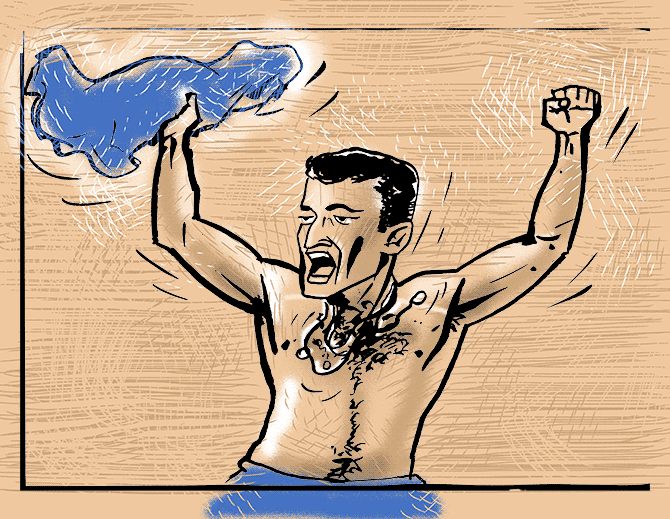'I became aggressive as a captain because I realised the players needed that backing...'
'We in India are brought up to be docile, goody-goody, but that needed to change on the field,' Sourav Ganguly tells Udit Misra.
Illustration: Dominic Xavier/Rediff/com

So tell me, did you like the book (Sourav Ganguly's A Century Is Not Enough)?" asks one of the people facilitating the interview. "Frankly, no," I say as I wait for my turn in the lobby of Vivanta by Taj in New Delhi to meet someone I believe is the best captain Indian cricket ever had -- yes, that's inclusive of M S Dhoni and Virat Kohli; I can't really comment on Tiger Pataudi though.
"But why?" she asks. I argue that it neither had the granular details of the key events -- say the decision to bowl first in the 2003 World Cup final -- nor was it as insightful as one imagined.
For the most part, Ganguly came across just as resentful and anxious as any one of us probably are in our careers. Unless, of course, that was the insight.
In which case, the book competently brings out how even a Ganguly -- the man who is credited to have discovered the spine of the Indian cricket team -- was a nervous wreck all along.
Once, he claims, he shouted at his mother (who was insisting on feeding him breakfast before a match) remonstrating with her on how he would face Wasim (Akram) and Waqar (Younis) if she fed him luchis and rosogollas.
The book representative retorts, "You see, he is like the Salman Khan of Indian cricket."
My brain suffers a minor convulsion at the comparison but I refrain from saying anything; I'd rather compose my thoughts because it was already my turn to interview Dada.
It is a hurried setting, exactly opposite to what is required for such an interview. Ganguly is meeting one journalist after another at pre-specified time slots and he has made it clear that he will not answer questions outside the book.
We meet just outside the room where the interview is supposed to happen. As we shake hands, he immediately asks, "You look familiar?" I am surprised. But I fall back on self-deprecating humour, as most Lucknowites do, and blame it on my very average face.
"No, no, I have seen you somewhere," he insists. By now I am feeling like Steve Waugh walking out with Ganguly for the toss. I again assure him we have not met.
Then, just as he settles down on the sofa, he announces his final verdict, "You remind me of that crime reporter on Aaj Tak." I cringe a bit as images of a bearded man sensationalising crime news on TV cross my mind.
I am confused, who is he comparing me to? And although we laugh -- his media manager, too, is in the room -- I make a mental note: He was the right person to unleash on those smug Aussies! The man seems to have an innate talent to sledge.
I start by asking him why he chose to focus on the anxiety of his playing days so much. He says because people only see the adulation, the hundreds, the fame -- no one sees the other side.
That besides the times when you are down and out, and trying your best to get back in the groove, even when you are on top there is a lot of effort required to stay that way and even that involves constantly fighting doubts.
I move to a related question. Since Ganguly had been part of the same dressing room in the early 1990s that featured the likes of Dilip Vengsarkar and K Srikkanth -- Indian teams that often wilted under the pressure put by dominating sides like the West Indies with fast bowlers such as Malcolm Marshall and Patrick Patterson -- I wonder whether Ganguly thinks his generation of players were qualitatively different from all the rest in the past.
He refuses to compare, saying they were different generations but also says that he was "fortunate to captain a great generation of players".
"Look at it this way," he says, "Viru (Sehwag), (Rahul) Dravid, Sachin (Tendulkar), Ganguly, (V V S) Laxman, (Anil) Kumble, Harbhajan (Singh) all ended up playing 100 tests; Zaheer Khan played almost 100... this speaks volumes for the impact this generation had on Indian sport."
That's true, I agree, but was it only the quality of the people, I ask; surely we had very capable batsmen and bowlers in the past. Or was there something else that made Ganguly's team click.
Because, I continue arguing, it is not too hard to imagine Dravid losing out on the one-day game -- actually, he almost did -- and, in fact, Laxman never played a World Cup despite his talents.
Similarly, it is also not very difficult to imagine Sehwag missing out on a Test career or for a Harbhajan remaining a lifelong discard for his so-called attitude problems in the early years. So what changed under Ganguly?
"Times had changed, captains had become more patient and players were given the right atmosphere," he asserts.
Ganguly says his own struggles early on in his career were the key to his captaining mantra. Dealing with those niggling doubts, in a systematic way, was the key to making his team qualitatively different from those before him. Sehwag was a good case in point.
"As a leader, you had to take care of the fear, the insecurity."
I recall what Ganguly writes in his book about the Indian team that exited the 2007 World Cup in the very first round -- 'It was a classy team but a scared outfit -- because under coach Greg Chappell no one felt secure.'
"That's true because players were not given the freedom to express themselves; there was always the fear that you may not play the next game." Ganguly sits back assured that the Greg Chappell period was just a blip and the current Indian team carries on that transformation which he initiated.
"Look at the freedom with which Kohli or Rohit play or, even more so, Pandya," he says with a sense of accomplishment. "Even as a country we have changed; we were very conservative earlier."
"I became aggressive as a captain because I realised the players needed that backing... We in India are brought up to be docile, goody-goody, but that needed to change on the field."
In the middle of this discussion, we have been served black coffee. Ganguly, who for the most part sat slumped in the sofa, nonchalantly looking into his mobile phone screen as he talked, now comes to the edge of the seat to pour milk and sugar in his cup.
"But aren't we overdoing it now?" I ask, referring to Kohli's frantic gesticulations. He immediately starts chuckling and says, "I'll ask him when I meet him next time: Who do you look at when you make those fists? Which dressing room do you look at? I laugh and laugh over it; he does it every ball."
Is that a good development? I mean, despite being unquestioned champions, the Aussies were hated precisely because of this; sharply in contrast to how West Indies cricket in the 1970s and 1980s was celebrated.
"Is cricket no longer a gentleman's game?" I ask. "That's off the field; not on the field anymore," he replies as a matter of fact.
I try probing him on some of the issues he has quite clearly avoided in the book. For instance, it remains a mystery how, almost all of a sudden, a man handpicked by Ganguly -- Greg Chappell -- decided to turn against him and managed to upstage the undisputed leader of Indian cricket to the extent that even Ganguly's father asked him to retire. But clearly, he is not interested in replying.
So I think I better get the question about his decision to bowl in 2003 out of the way. "It had rained overnight. The game started late because there were wet spots on the pitch and I thought we could get Australia 100 for 5... but we just didn't bowl well enough," he says without betraying any scars.
"100 for 5? Do you always go about visualising this way?" Yes, he says, "As a captain, you always have to think ahead."
So what is your next act, I ask. His last answer confounded me more than his initial query: "I don't know. We'll see, I don't think too far ahead."
As I take his leave, I can't help wondering how he might fare if he were to enter Indian politics.













 © 2025
© 2025